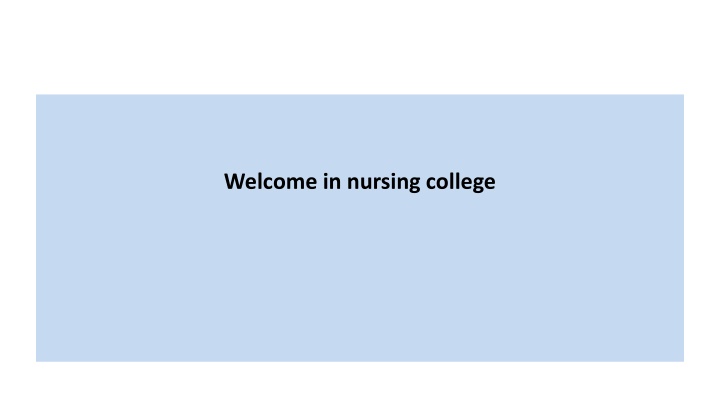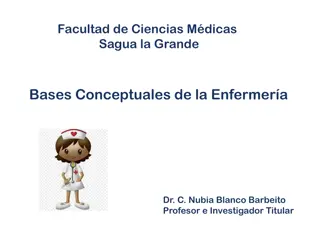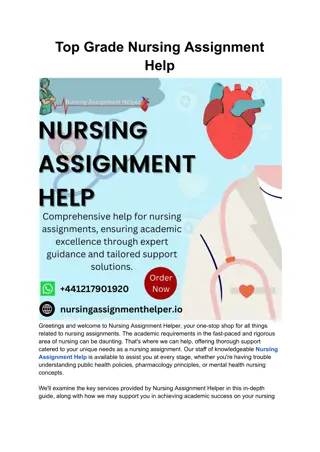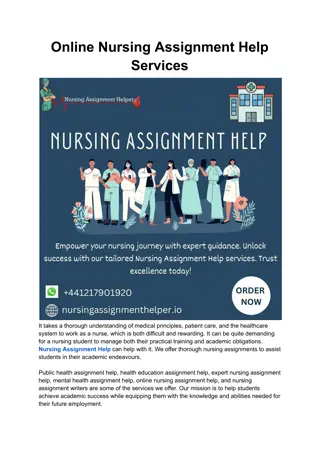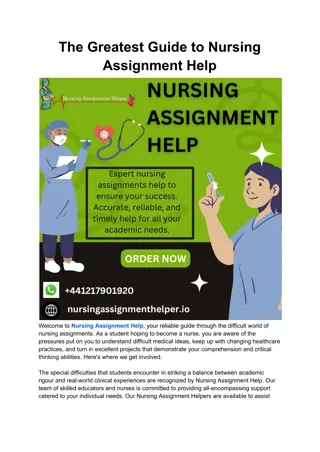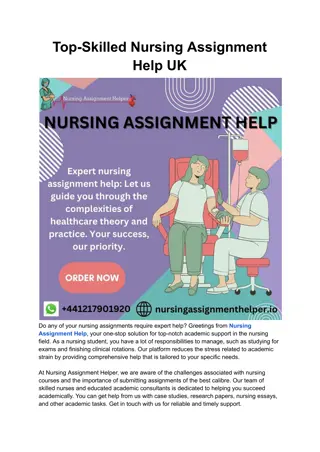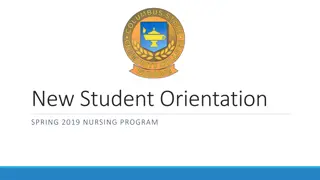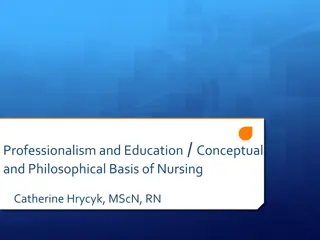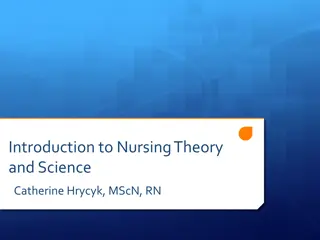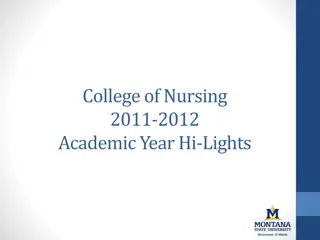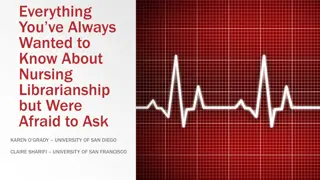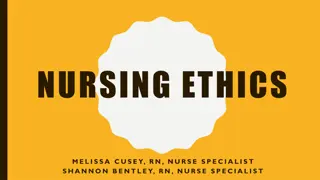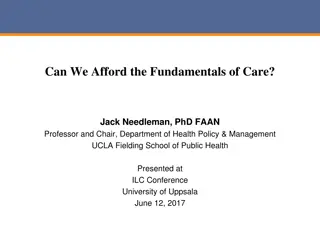Nursing College Introduction and Course Overview
This content provides an overview of the nursing college experience, including the vision and mission of King Saud University's College of Nursing. It introduces a course on the nursing profession, emphasizing roles, history, and communication skills. Objectives of the course, educational preparations, healthcare system descriptions, and assessment details are outlined. The course aims to prepare students for a successful career in nursing through quality education and personal growth.
Download Presentation

Please find below an Image/Link to download the presentation.
The content on the website is provided AS IS for your information and personal use only. It may not be sold, licensed, or shared on other websites without obtaining consent from the author.If you encounter any issues during the download, it is possible that the publisher has removed the file from their server.
You are allowed to download the files provided on this website for personal or commercial use, subject to the condition that they are used lawfully. All files are the property of their respective owners.
The content on the website is provided AS IS for your information and personal use only. It may not be sold, licensed, or shared on other websites without obtaining consent from the author.
E N D
Presentation Transcript
KING SAUD UNIVERSITY College of Nursing Vision of the College: To be a center of excellence, nationally, regionally and internationally, in nursing education, research, and community services. Mission of the College: Through distinguished quality education and scientific research, the college of Nursing prepares students to be competent in their professions, health organizations, and communities.
Course: NURS 211 INTRODUCTION TO NURSING PROFESSION Semester: 1nd semester Credit Hours: 2 credits Faculty: Dr. Abdualrahman Alshehry, Ph.D.,MSN,CCRN,BSN,RN Email : abdalshehri@ksu.edu.sa Webpage: fac.edu.sa/abdalshehri
Course Description This course introduces students to the concepts and roles of professional nursing. It emphasis is on the caring role of the nurse and the importance of interpersonal communication. The course also focuses on the past and current history of nursing and the influences.
Objectives At the end of the course, the students will able to: Describe the breadth and variety of roles, professional knowledge, and characteristics integral to a baccalaureate prepared nurse. Examine the development of nursing as a profession. Explain the relationship of nursing to other health professions and the health care system.
Distinguish between the different educational preparations for various levels of nursing practice. Describe the health care system and the factors that influence the delivery of health care. Describe the phases of the nursing process. Understand the need for continued personal and professional growth in nursing.
Midterm 60 marks Learning Related Activities 5 marks Attendance (60%) = 3 marks Homework (20%) = 1 mark Presentation ( 20%) = 1 mark 1st Midterm Exam - 20 marks 2nd Midterm Exam - 20 marks Quiz Final 40 marks Final exam 40 marks Q#1 - 5 marks Q#2 5 marks Q#3 5 marks - 15 marks Total = 100Marks
Nursing Defined By: Florence Nightingale The act of utilizing the environment of the patient to assist him in his recovery" (Nightingale, 1860). Nightingale considered a clean, well-ventilated, and quite environment essential for recovery. Virginia Henderson The unique function of the nurse is to assist the individual, sick or well, in the performance of those activities contributing to health or its recovery (or to peaceful death)".
Canadian Nurses Association (CNA) Described nursing practice as a dynamic, caring, helping relationship in which the nurse assists the client to achieve and obtain optimal health American Nurses Association (ANA) "Nursing is the diagnosis and treatment of human responses to actual or potential health problems".
Origin: of NURSING late Middle English: contraction of earlier nourice, from Old French, from late Latin nutricia, feminine of Latin nutricius (person) that nourishes , from nutrix, nutric- nurse , from nutrire nourish .
Common Themes in these Definitions Nursing is A profession Caring. An art. A science. Client centered. Holistic Adaptive
Concerned with health promotion, health maintenance, and health restoration. A helping profession.
Components of Appropriate Definitions Any appropriate definition of nursing must reflect: What is the nature of nursing? What is the purpose of nursing profession? What is the domain of nursing profession? What is the focus of nursing profession?
What are the types of nursing interventions? What are the roles that a professional nurse can play in the health care system? Who are the clients of nursing profession? Who are partners of nurses in the process of care provision? What is not nursing?
Nature of Nursing Nursing is profession as opposed to occupation, Intellectual (as opposed to physical) Body of knowledge through research Practical as well as theoretical Highly specialized professional education Strong internal organization of members
Nursing is: A Science A practice An art
Purposes of Nursing To promote health, healing, growth and development, To prevent disease, illness, injury, and disability.
When dealing with ill or disabled people To minimize distress and suffering To enable people to understand their disease treatment and its consequences. To enable people to cope with their disease or disability.
When dealing with people who are approaching death To maintain the best possible quality of life until its end.
Nursing is not Medicine Nursing uses a similar body of knowledge of medicine (i.e. BIO, psych, chemistry, etc .) Medicine diagnosis, to cure Nursing diagnosis to facilitate change Nursing holistic wellness focus Similar to medicine, nursing is a science based on theories supported by research that defines, describes and directs practice
Historical Background of Nursing Objectives Describe the historical background on nursing profession Illustrate how Islam contribute to nursing Discuss historical improvements of nursing profession in Saudi Arabia
Historical Background of Nursing Nursing has a history as long as that of human kind. Human beings have always faced the challenge of fostering health and caring for the ill and dependent. Uprichard (1973) described the early history of nursing using three images: The folk image The religious image, and The renaissance image.
The Folk Image of Nursing The Nurse as Mother The early development of nursing was rarely documented, so we must speculate about its character from what we know of early civilizations. The nurse was generally a member of the family or, if not, then a member of the community who demonstrated a special skill in caring for others. Nursing in this perspective was seen largely as a feminine role an extension of mothering.
The Religious Image of Nursing The Nurse as God s Worker In the Bible, a woman named Phoebe is identified as the first deaconess, a word meaning servant or helper. Deaconess cared for widows, orphans, and the sick. In the middle Ages, the traditional role of the religious groups in caring for the ill was continued by various orders of monks and nuns. Women of bad reputations
Poor, single women with no family or hope of marriage Prisoners, servants and slaves During this time, unfortunately, the knowledge of hygiene and sanitation gained by Greek, Roman, Egyptian, and other ancient civilizations was forgotten. There was no growth or development in knowledge regarding care of the sick.
Nursing in Islam The Muslim religion has a similar tradition of service to others in the name of God. Rofiada al Islamiah, who cared for the sick and injured, is considered the mother of nursing in the Mideastern Muslim countries She trained women and young girls in the art of nursing and nursed the sick and wounded during times of war.
The duties of the nurses in times of war were to provide water for the sick and wounded, tend to their injuries, give medicine as needed, provide comfort measures and transport the dead back to Madinah In following years, the writings of Hippocrates and Galen were translated to Arabic Nursing was improved alongside medicine during the Muslim empire. Hospitals were built and an extensive Materia Medica was built
Rufayda Al Islamiya Accomplishments of Rufayda Al Islamiya She devised the first nursing code of conduct and ethics based on Islam She established clinics in the Mosque She is the founder of the first school of nursing for women
Characteristics of Rufayda Al Islamiya: Kind and empathetic A capable leader and organizer Able to mobilize others Clinical and training skills Did not confine her nursing to the clinical situation and went out in the community
Nursing prior to the late 1800s Required no specialized training Paid badly, if at all Was considered unrespectable Carried out under terrible conditions Was NOT regarded as A profession Often did little to help patients recover
The Renaissance Image of Nursing The Nurse as Servant There was a radical change from the image of the selfless nurse that had developed in the Middle Ages. Care of the ill was delegated to servants and those unable to find any other means of support. The hospitals of this time were overwhelmed by deadly disease and filled with death; those who worked in them were seen as corrupt and unsavory.
The Emergence of Modern Nursing Nursing as a profession Emerged in late 19th century Credit is given to Florence Nightingale
Florence Nightingale She was born in 1820 and died in 1910 Born in Italy to wealthy English parents Frustrated by lack of options for women of her social background
Defied parents and society and traveled to Germany and throughout Europe to train as a nurse Her big opportunity came when the Crimean war broke out in 1854
Florence Nightingale During Crimean War Secretary of War asked her to go take charge of the hospital at Scutari in Turkey. Nightingale showed up with 38 trained nurses and faced a death rate of 40%
Nightingale found that conditions in the military hospitals were abominable. The absence of sewers and laundry facilities, the lack of supplies, the poor food, and the disorganized medical services contributed to a death rate of more than 50% among the wounded.
Florence Nightingale Accomplishments She established cleanliness and sanitation rules Patients received special diets and plenty of food Improved water supply Patients received proper nursing care
Nightingale established a reputation which allowed her to improve nursing standards at home Nightingale s strong statements about the role of nurses and their need for lifelong education are still quoted widely today
Florence Nightingale Accomplishments (cont.) Established nursing school at St. Thomas Hospital, London. By 1887, had her nurses working in six countries and U.S.
Developed basic philosophy re: the profession of nursing different from other existing programs She was a nurse, philosopher, statistician, historian, politician and more Today she is considered the founder of modern nursing
